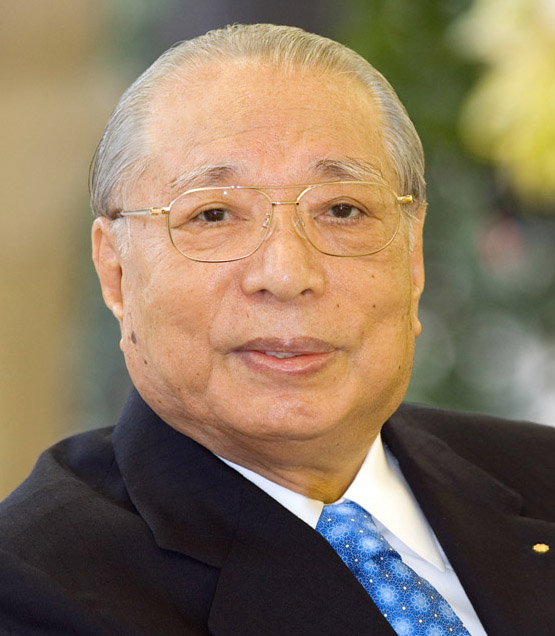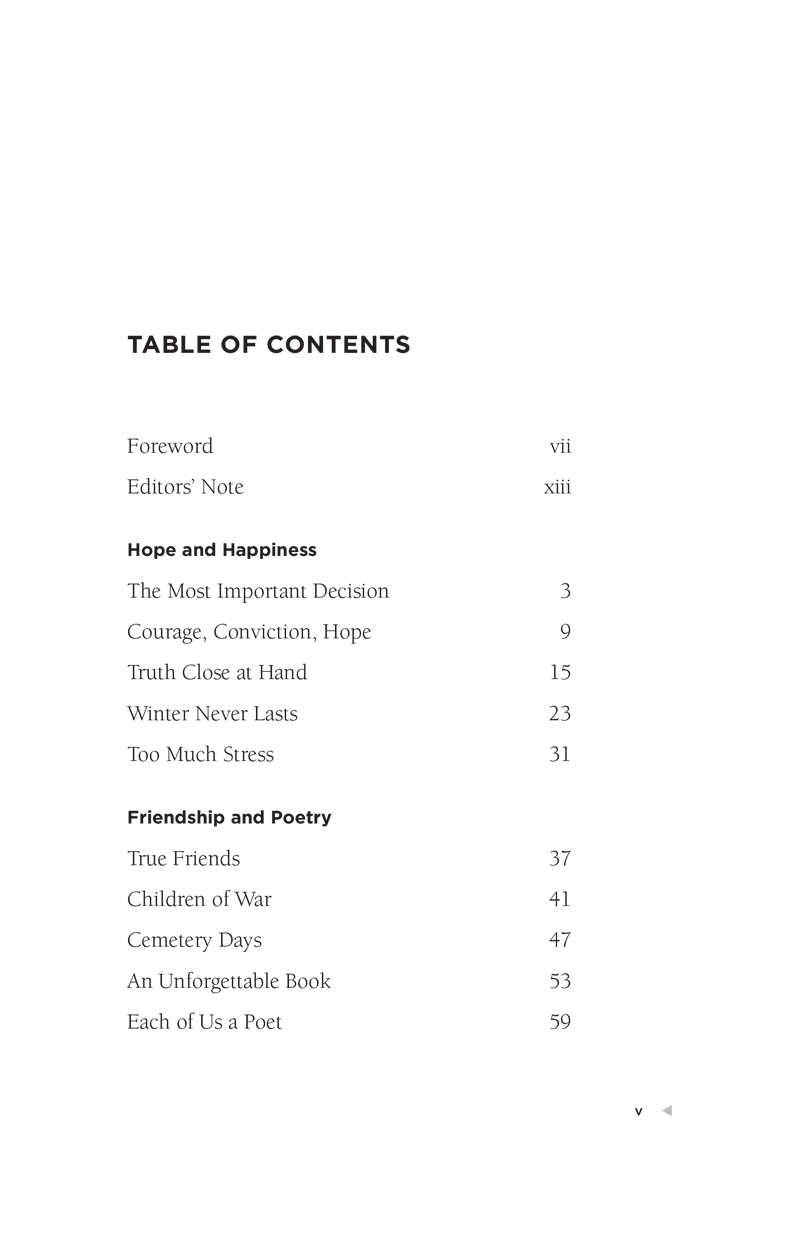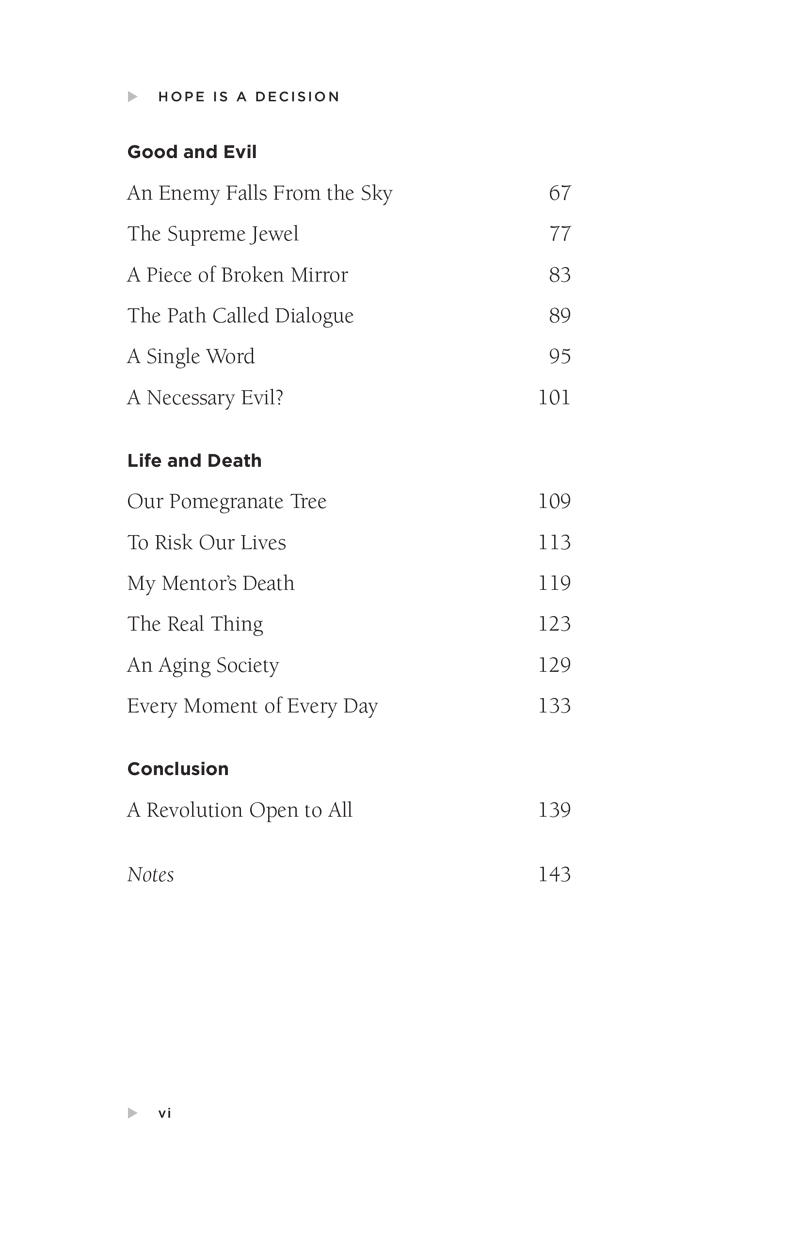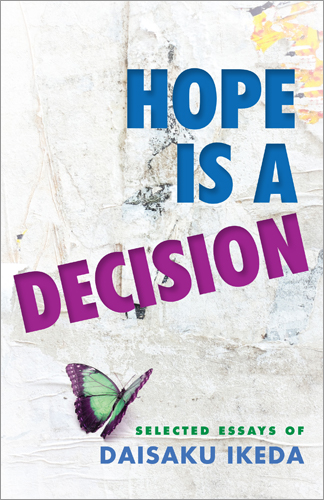Hope Is a Decision
What do we do when we’ve lost all hope? Is hope something found or something made? What can one person do against the vast forces that run our world? How do we remain optimistic when the world seems to be falling apart around us?
Renowned Buddhist thinker and peace activist Daisaku Ikeda has spent his life wrestling with essential questions such as these. In these intimate essays—selected from more than forty years of his works—he shares his inspirational journey to find answers and hope in troubled times.
Growing up a “child of war,” Ikeda shares vivid stories that lie at the root of his lifelong dedication to creating peace: his homes burning down during the Tokyo fire bombings of World War II, his eldest brother’s death on the frontlines in Burma, his encounter with an American airman who parachuted into his neighborhood after his B29 was shot down.
Ikeda’s incisive commentaries on terrorism, good and evil, aging and death give us new perspectives on approaching the world with hope. Lyrical reflections on poetry and friendship highlight how such spiritual pursuits are the wellsprings hope in dark times.
Each essay suggests ways in which each of us can connect our personal search for strength, wisdom, and hope to the collective desire to bring about a just, humane, and caring society.
In Hope Is a Decision, Daisaku Ikeda invites us to dig deeper into our own lives so that we can change the world around us.
 Daisaku Ikeda is president of the Soka Gakkai International, a lay Buddhist association pursuing the values of peace, culture and education and committed to fostering within individuals a sense of responsibility for the shared global community. He is also the founder of a number of educational, cultural and research institutions. Prolific writer, poet and peace activist, he is recognized as one of the leading interpreters of Buddhism, bringing its timeless wisdom to bear on the many contemporary issues confronting humanity. Among the hundred of honors received worldwide, he is recipient of the United Nations Peace Award, the Rosa Parks Humanitarian Award, and the International Tolerance Award of the Simon Wiesenthal Center.
Daisaku Ikeda is president of the Soka Gakkai International, a lay Buddhist association pursuing the values of peace, culture and education and committed to fostering within individuals a sense of responsibility for the shared global community. He is also the founder of a number of educational, cultural and research institutions. Prolific writer, poet and peace activist, he is recognized as one of the leading interpreters of Buddhism, bringing its timeless wisdom to bear on the many contemporary issues confronting humanity. Among the hundred of honors received worldwide, he is recipient of the United Nations Peace Award, the Rosa Parks Humanitarian Award, and the International Tolerance Award of the Simon Wiesenthal Center.
“Philosopher, prophet and poet of the power of hope and happiness, Daisaku Ikeda draws from the well-spring of his eventful life and imparts page after page of rich insight, royal wisdom and spiritual truth with a style reminiscent of a comfortable living room conversation. This volume will greatly strengthen your devotional meditations and commitment to personal and global peace.”
—Dr. Lawrence E. Carter Sr.
“The brilliant mind and all-embracing compassion of Daisaku Ikeda shine luminously in each of his selected essays in Hope Is a Decision. His deep insight into human mind and their emotions and remarkable power of analyzing those in his absolutely absorbing writing style make the book not only a fascinating and profound intellectual experience but opens up an opportunity for each reader for introspection and self-transformation. The breadth of his vision and the conviction with which he assures us that a bright future is possible individually and collectively are deeply inspiring, particularly at a time when the need for such a message of hope and belief in the humanity’s inherent strength is keenly felt. In this collection Daisaku Ikeda beckons us to probe deeper into our own lives so that we can change the world around us. Having witnessed and experienced the worst, he reaffirms that life does continue, that the light of hope can be found in the very darkest corners. The book bears an eloquent testimony to his own life’s mission of bringing out the goodness of humanity by championing dialogue and the culture of peace that promote understanding, respect and oneness humanity.”
—Ambassador Anwarul K. Chowdhury
“Daisaku Ikeda’s Hope is a Decision gives a broad and insightful overview into the thinking of the acclaimed Buddhist religious leader who has been nominated for a Nobel Peace Prize and has won countless other accolades for his work on global peace after surviving the horrors of World War II.
Hope is a Decision compiles his essays on subjects such as how to approach death, how to find true happiness, and his personal interactions with Rosa Parks. Ikeda’s lyrical and contemplative musings give ample reason for hope and optimism, especially during a time when darkness seems to be descending on the world.
“Ikeda writes about wide-ranging topics, such as how to overcome feelings of powerlessness, how to outgrow the struggles of youth, and how to avoid the stress from overwork that is blamed for high suicide rates and early death in Japan. He seeks answers to big questions, such as what human existence is, why people aren’t happy, whether death must loom for a person to feel truly alive, and what one person can accomplish “in the face of the vast forces that run our world.” The overarching issue of hope takes center stage, as Ikeda views it as a life-changing force that can be sparked by anything and must be nurtured regardless of circumstance.
“Hope is a Decision contains many profundities and elucidates Ikeda’s deep thoughts well. In essay after essay, all relatively brief, he spells out how people can pursue personal fulfillment and the betterment of society. His message is universal and holds up over the half century during which he penned the essays. The collection succeeds in distilling complex issues to their essence. Ikeda, for instance, describes peace as ‘a competition between despair and hope, between disempowerment and committed persistence’ and adds, ‘To the degree that powerlessness takes root in people’s consciousness, there is a greater tendency to resort to force. Powerlessness breeds violence.’
“Strong, clear writing pervades Hope is a Decision. The book is a carefully curated selection of the best essays of a prolific writer, so all the entries shine. The essays do not stint on personal and autobiographical details. The book occasionally veers into the self-indulgent, such as when Ikeda quotes a long passage of his previous work. Sometimes the writing seems a trifle slapdash and off the cuff, such as when he anonymously quotes “another poet” he could have cited by name. But flaws are few and minor.
“The grandly ambitious Hope is a Decision explores good, evil, happiness, art, aging, death, terrorism, the relentless, ominous ticking of the Doomsday Clock and, most of all, hope. Ikeda has much to say about the human condition, and he does so artfully and with great understanding.
—Foreword Reviews
Synopsis: How do we remain optimistic when the world seems to be falling apart around us? In the intimate essays by Daisaku Ikea that comprise “Hope Is a Decision” the author leads the reader on an inspirational journey to find answers and hope in troubled times. “Hope Is a Decision” includes incisive commentaries on terrorism, good and evil, and aging and death that provide a new perspective on approaching the world with hope. The lyrical reflections on poetry and friendship highlight how such spiritual pursuits are the wellsprings of hope in dark times. Each essay suggests ways in which anyone can connect their personal search for strength, wisdom, and hope to the collective desire to bring about a just, humane, and caring society.
Critique: Buddhist philosopher, educator, author, and anti-nuclear activist, Daisaku Ikeda (born 2 January 1928, Japan) is the founder and president of the Soka Gakkai International. He has written and lectured widely on Buddhism, humanism, and ethics, and he has published dialogues with global figures such as Arnold Toynbee, Linus Pauling, and Mikhail Gorbachev.
“Hope Is a Decision: Selected Essays is his latest contribution of timely, relevant, contemporary commentaries on the critically important issues of life in our world today. Informed and informative, thoughtful and thought-provoking, inspired and inspiring, Hope Is a Decision: Selected Essays is very highly recommended for both community and academic library collections. It should be noted for personal reading lists that Hope Is a Decision: Selected Essays is also available in a Kindle format.”
—Midwest Book Review
Hopeful and Highly Relevant
“Daisaku Ikeda is a Buddhist philosopher, educator, essayist and anti-nuclear activist. This book is a compilation of selected essays he has written during the bleak times when he battled his childhood illness, surviving through WWII in Japan, facing the death of his mother and brother – his essays explore humanism, free-thinking, poetry, cultural exchanges of peace, hope-based dialogue and ultimately the message that we should always be hopeful despite the hard times.
“Even though Ikeda’s essays were written so long ago during WWII, a lot of his essays on hope can be applied to today’s society. At first I thought this will be a highly idealistic read but I was surprised on how essential these essays are to today’s world where hope is so fragile. How can we remain hopeful at times like these, and how can life be more meaningful? Ikeda teaches us that ‘the key to live in a stress-filled society lies in feeling the suffering of others as our own – in unleashing the universal human capacity for empathy.’ There are some really great nuggets of wisdom in his essays, if you feel like a thought-provoking and reflective read, I highly recommend this book!”
Some other great quotes from this book:
“We can best negotiate the challenges we face when guided by hope, not when motivated by fear.”
“There is no need for anyone to carry the burden of a heavy heart alone.”
“Genuine happiness can be achieved only when we transform our way of life from the unthinking pursuit of pleasure to one committed to enriching our inner lives, to a focus on being more rather than simply having more.”
—Review by NJ


The Most Important Decision
LOOKING AT THE WORLD today, it is easy to feel despair. A kind of powerlessness seems to be the prevailing mood in the world today. Decisions about important issues all seem to be made somewhere beyond our reach. What can one person accomplish in the face of the vast forces that run our world? The current of the times can seem so fast flowing and complex as to be overwhelming.
I do not believe that people are powerless. The philosophical tradition that I embrace teaches on the most fundamental dimension—that of life itself—that each human life partakes of the limitless life force of the cosmos. The same power that moves the universe exists within our lives. Each individual has immense potential, and a great change in the inner dimension of one individual’s life has the power to touch others’ lives and transform society. Everything begins with us.
As Nigerian author and poet Ben Okri wrote in his poem “Mental Fight”:
You can’t remake the world
Without remaking yourself.
Each new era begins within.
It is an inward event,
With unsuspected possibilities
For inner liberation.
The term my mentor, Josei Toda, used for this process of inner transformation that also transforms our surroundings was human revolution. And I believe it is the most fundamental, most vital of all revolutions. It can create changes that are more lasting and valuable than political, economic, or technological revolutions. For no matter how external factors change, the world will never get better as long as people remain selfish and apathetic.
An inner change for the better in a single person—one person becoming wiser, stronger, more compassionate—is the essential first turn of the wheel toward realizing peaceful coexistence and fulfillment for the whole human race. I firmly believe that a great human revolution in just one person can be the start of a transformation in the destiny of whole societies and all humankind. And for the individual, everything starts in the inner reaches of life itself.
When we change our inner determination, everything begins to move in a new direction. The moment we make a powerful resolve, every nerve and fiber in our being will immediately orient itself toward the fulfillment of this goal or desire. On the other hand, if we think, “This is never going to work out,” then every cell in our body will be deflated and give up the fight.
Hope, in this sense, is a decision. It is the most important decision we can make. Hope changes everything, starting with our lives. Hope is the force that enables us to take action to make our dreams come true. It has the power to change win- ter into summer, barrenness to creativity, agony to joy. As long as we have hope, there is nothing we cannot achieve. When we possess the treasure of hope, we can draw forth our inner potential and strength. A person of hope can always advance. Hope is a flame that we nurture within our hearts. It may be sparked by someone else—by the encouraging words of a friend, relative, or mentor—but it must be fanned and kept burning through our own determination. Most crucial is our determination to continue to believe in the limitless dignity and possibilities of both ourselves and others.
Mahatma Gandhi led the nonviolent struggle for Indian independence from British colonial rule, succeeding against all odds. He was, in his own words, an “irrepressible optimist.” His hope was not based on circumstances, rising and falling as things seemed to be getting better or worse. Rather, it was based on an unshakable faith in humanity, in the capacity of people for good. He absolutely refused to abandon his faith in his fellow human beings.
Keeping faith in people’s essential goodness, and the consistent effort to cultivate this goodness in ourselves: These are the twin keys, as Gandhi proved, to unleashing the great power of hope. Believing in ourselves and in others in this way—continuing to wage the difficult inner struggle to make this the basis for our actions—can transform a society that sometimes seems to be plummeting toward darkness into a humane, enlightened world, where all people are treated with respect.
There may be times when, confronted by cruel reality, we verge on losing all hope. If we cannot feel hope, it is time to create some. We can do this by digging deeper within, searching for even a small glimmer of light, for the possibility of a way to begin to break through the impasse before us.
And our capacity for hope can actually be expanded and strengthened by difficult circumstances. Hope that has not been tested is nothing more than a fragile dream. Hope begins from this challenge, this effort to strive toward an ideal, how- ever distant it may seem.
It is far better to pursue a remote, even seemingly impossible goal than to cheat ourselves of the forward motion that such goals can provide. I believe that the ultimate tragedy in life is not physical death. Rather, it is the spiritual death of losing hope, giving up on our own possibilities for growth.
Toda once wrote:
In looking at great people of the past, we find that they remained undefeated by life’s hardships, by life’s pounding waves. They held fast to hopes that seemed mere fantastic dreams to other people. They let nothing stop or discourage them from realizing their aspirations. The reason for this, I feel certain, is that their hopes themselves were not directed toward the fulfillment of personal desires or self-interest but based on a wish for all people’s happiness, and this filled them with extraordinary conviction and confidence.
Here he pointed to a crucially important truth: Real hope is found in committing ourselves to vast goals and dreams— dreams such as a world without war and violence, a world where everyone can live in dignity.
The problems that face our world are daunting in their depth and complexity. Sometimes, it may be hard to see where—or how—to begin. But we cannot be paralyzed by despair. We must each take action toward the goals we have set and in which we believe. Rather than passively accepting things as they are, we must embark on the challenge of creating a new reality. It is in this effort that true, undying hope is to be found.

